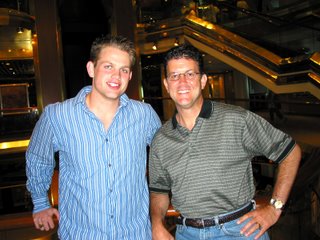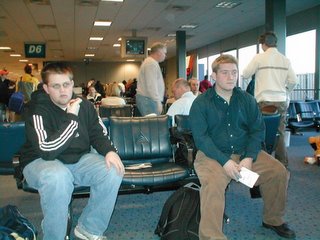Most of my childhood and up until my freshman year of college was spent being fairly overweight. My freshman year, I met my future best friend Z who also had similiar weight issues. We busted our asses and between the two of us lost close to 100 pounds. Our debate coach DB even made a joke that we should do a before and after poster with some subtitle that says, "Look what Carolina Debate can do for you!"
It really is quite amazing how different people treat you just because of how you look. Renee Zwellwegger, when she gained all that weight for Bridget Jones Diary talked about it in one interview, noting that when she was overweight people never held open doors for her or anything like that. And it's true, but a world that most people won't ever know without being

overweight.

I'm on the left in both pictures, so there is the before and after... except after and before. You get the point.
Anyway, when it came to writing my law school personal statement I couldn't think of anything to write about... Diversity? Challenges? I was a white, suburban male from a middle-upper class family, so it was hard to fulfill some of the expectations set forth by the applications. For a while, I thought about the sarcastic approach but realized while it might be entertaining for the first 50 words or so, the adcomms would probably just figure me for a pompous ass after that, which may not have been the worst character call in the world, but I digress. So, I decided to write on what it was like to grow up overweight. After a lot of thinking, I decided to post my personal statement on the web. Some people are overly protective of their writing, or embarrassed to put such things up for public ridicule... but I know that I would have liked to read some personal statements to get a feel for them before the application process, so if it helps anyone or makes anyone think a little, I guess it's worth it.
As a disclaimer, I'm sure this thing is riddled with errors. For one, I have never been one for extensive editing of these papers, maybe because of my success with my undergrad applications that I really didn't put too much effort in, but also because it is a personal statement, not some research paper. The errors give it some character and, if there are grammatical errors, I'm sure it helps maintain the narrative sense of the statement instead of making it overly formal. I also have not even looked at this since I sent in my applications so who knows what it even looks like. So without any further ado....
My life has often seemed like a fairy tale. Unfortunately, this Brother Grimm has often felt less like Prince Charming, and more like an ugly duckling. Most of my high school years, and even a portion of college, were spent being obese. At 6 feet tall and 240 pounds, I was hardly a spectacle of physical fitness. This is not an essay designed to elicit sympathy. Rather, it is intended to detail the circumstances surrounding my childhood and adolescence.
Many law school applications ask you to write an essay detailing how you can add to the diversity of their incoming class. As examples, distinctions of class, race, socioeconomic status, and nationality are often listed. Obesity, or harsher still, unattractiveness, to my knowledge, never appears as a categorical distinction on any law school application Yet, I can think of no other factor which has shaped my social interactions to a greater degree than my struggle with my weight.
The specter of obesity has loomed large. From as early as second grade I can remember being pelted with nicknames of “fatty,” “chubs,” and the extreme “Shamu the Killer Whale.” Even on a retreat with a church group, the same members that preached “love thy neighbor,” were ironically not hesitant to hurl insults. For a while, my situation seemed both dire and hopeless. Trying to change my personality to suit what I thought was popular was both fruitless and depressing. Even to a young mind, the idea of sacrificing my identity for the sake of popularity was unfathomable.
Dieting did nothing to change the attitudes of those whom I called my peers. In tenth grade, I started attending Weight Watchers with my mom and managed to lose almost thirty-five pounds. However, the change in my physical appearance was not enough to outweigh the memories of my former self in both the eyes of my peers and myself. The frustration of four months of hard work combined with still being cast as a social pariah was enough to cause me to regain the weight.
Attending college at the University of South Carolina provided a fresh start for me. Since the school was sparsely attended by anyone from my high school, there were few people who had a memory of an overweight Chris ingrained in their heads. A friendly wager from my freshman-year roommate was all the motivation I needed to begin my transformation. After six months of a stringent diet and frequent exercise, I had lost almost fifty-five pounds. While the change was not drastic enough to land a Subway commercial deal, my life has never been the same since. Though I would never consider myself to be a “meathead,” my daily trips to the gym are my release; it is a time to be free from the demands of a full class load combined with a competitive collegiate debate schedule.
The only holdover from those days is a nickname that I have carried since my freshman year of high school. These days the moniker has become shortened to reflect my smaller size. Formerly “Big Hoss,” the name serves as a light reminder of my past, a culmination of events and relationships that have shaped who I am as a person today. Simultaneously, it strikes a chord within me that appearances are only skin-deep, and a cursory glance at a person is never adequate to judge the true measure of their character. To dismiss someone based solely on a vain and arbitrary factor is not only mean-spirited, but denies them of the very thing that makes them human. This lesson has taken me nearly twenty-one years to fully appreciate, and one I find far more valuable than anything a book or a lecture can teach. These life experiences have enabled me to approach anything as a blank slate, tabular rasa. All too often, predispositions blind us from seeing the truth that stands directly before us, a lesson that is equally applicable to treatment of others or a new learning endeavor.



